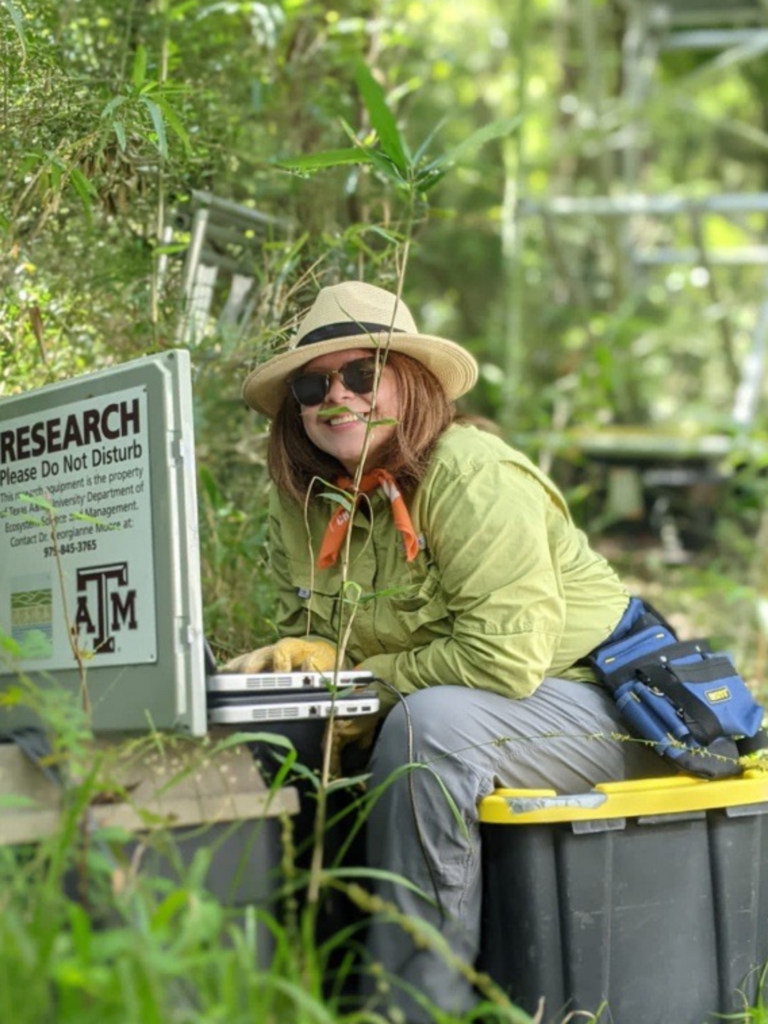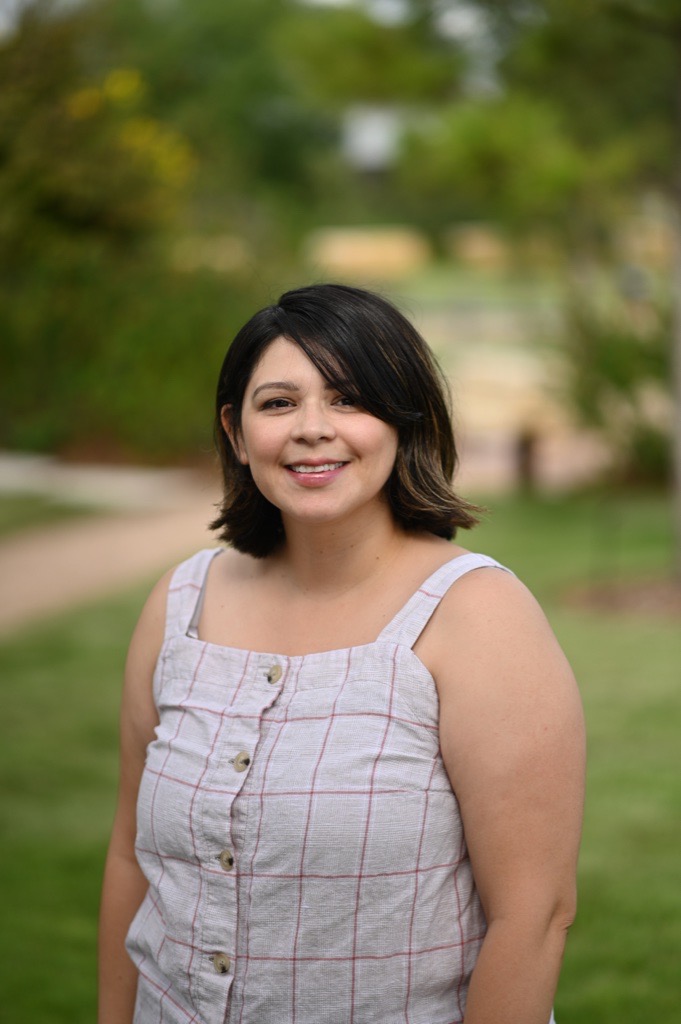Doctoral candidate, mother and first-generation Aggie is passionate about ecology and the environment
Miriam Catalan ’24, ecology and conservation biology major, shares her story
Miriam Catalan, a doctoral candidate in the Department of Ecology and Conservation Biology, says her experience as a graduate student has been nontraditional. She has balanced the challenges of graduate school while also being a parent and a first-generation college student.

From being president of the Aggie Pregnant and Parenting Student Organization to her selection for the Tom Slick Graduate Research Fellowship, she really enjoys doing it all and being involved within the College.
Catalan is currently working with ecology and conservation biology associate professor Carol Loopstra, Ph.D., and is co-chaired by a former professor in the department, Georgianne Moore, Ph.D.
She sat down with us to share her experience and accomplishments in the Department of Ecology and Conservation Biology in the College of Agriculture and Life Sciences, and her plans for the future.
What made you want to be part of the Texas A&M College of Agriculture and Life Sciences, studying ecology and conservation biology?
I decided to pursue a doctoral degree in the College and the legacy department ESSM-Ecosystem Science and Management because I was interested in working in the Moore Ecohydrology lab.
Dr. Moore is an expert in this field, and I wanted to learn more about this method and build toward my understanding of central theories in ecohydrology.
What advice would you give prospective students pursuing the same degree?
I advise students to seek opportunities that benefit their interests and careers by volunteering in research or taking courses that provide experiential or high-impact learning. Immerse yourself in opportunities that will teach you the most techniques in your field to learn a wide breadth of skills that make you more competitive for jobs and graduate school.
What are your career goals and how do you hope to use what you have learned in ecology and conservation biology?
I want to pursue a career with a government agency such as the USDA Agricultural Research Service, ARS, or the Natural Resources Conservation Service, NRCS, as a plant ecophysiologist or a national forester. My department has exposed me to the recent advancements in sustainable management practices in forestry, agriculture and urban environments that have prepared me for these positions.
I have also considered pursuing a career at an academic institution. Therefore, I am open to applying to post-doctoral positions after I graduate as well so that I can get more experience in the field and get additional publications.
My hope is that my experiences in conservation and collaborative research will support my career goals.
In your opinion, what makes the Department of Ecology and Conservation Biology stand out?
This department provides programs and courses for students to get hands-on learning experiences that help prepare and train them to be the next generation of scientists. The program offers several courses that engage students to learn foundation ecological topics through field-based courses that study Texas’ terrestrial and aquatic ecosystems.
I taught a course as a graduate student – the Fundamentals of Ecology lab, and it was one of my favorites. In this class, students learn the principles of field ecological research through four modules about the scientific method, hypothesis testing, statistics and science communication. Students can pose their own research questions and hypotheses to learn about animal behavior, aquatic and community ecology. This is just one example of the field-based courses our amazing department offers.
The department is collectively making scientific advancements in the field of conservation ecology, which is extremely vital given the changes in ecosystem goods and services such as clean air, water, fertile soil, pollination and biodiversity due to climate change and urbanization. Through technological advancements in modeling, sustainable practices and management plans, the department is working on conservation ecology that protects the ecosystem goods and services so that future generations can enjoy them.
The department also offers a wide breadth of research focused on conserving ecosystem goods and services in forestry, agriculture, wildlife, fisheries, ecotourism and pasturelands. Their partnership with the International Union for Conservation of Nature, IUCN, demonstrates to us students the impact on conservation science.
What advice would you give other student mothers pursuing a doctoral degree?
Keep calm. You can pursue graduate school if you have a supportive community and mentor. Motherhood can be challenging, but it could also enhance your program experience. I would advise pregnant and parenting students to seek out a supportive community and network with professionals who are also raising families. Understand the resources your university offers to support pregnant and parenting students.
Texas A&M has many programs in the School of Nursing open to pregnant and first-time parents catered toward developing both the child and student. I am the president of the Aggie Pregnant and Parenting Student Organization, APPSO, which focuses on supporting student parents through advocacy, service, research and education. I have teamed up with a department faculty member, Dr. Jessica Light, to promote student-parent success at Texas A&M. Through generous donations, we have provided seven scholarships to both undergraduate and graduate students.
What does it mean to you to be selected as a Tom Slick Graduate Research Fellow? How has your coursework and experience in your major helped you on your journey to receive this recognition?

I am so proud to be selected for the highly competitive Tom Slick Graduate Research Fellowship. I am grateful for my family, friends and mentors who encouraged me to apply for this fellowship. This prestigious fellowship will help fund the remaining duration of work leading to the completion of my dissertation research and writing. This fellowship also provides funding for me to visit another lab to learn new techniques.
My past and present experiences made me competitive for this award. Completing my undergraduate degree gave me the confidence to pursue higher education despite the financial burden and imposter syndrome that arises from being a first-generation Hispanic college student. I was fortunate enough to participate in programs that ensured students’ success in higher education and government careers.
Since my time here at Texas A&M, I have developed critical thinking skills and pioneered new methodologies in thermal dissipation sap flow radial profile characterization at finer spatial scales. My dissertation will advance our understanding of how wood anatomy relates to water use in trees. My hands-on learning experience during my time here plays a role in my confidence and success.
In the fall, I will visit the first national environmental research park in Georgia to learn a calibration technique to enhance one of my dissertation projects.
What are some of your greatest achievements that have come to you through your education in the College?
I am an Aviles-Johnson fellow, and I have also received a few scholarships, such as the Lechner scholarship, the Howard A. Shaw Memorial Scholarship and the Vola and Fred ‘95 scholarship. I also received the Water Resources and Policy Initiatives/United States Department of Agriculture Watershed Management Doctoral Student Scholarship to support part of my research expenses. These funding sources allowed me to complete all the milestones in my program and contributed to my professional development.
Last year, I received the outstanding doctoral student award from the College of Agriculture and Life Sciences chapter of Gamma Sigma Delta, recognizing my research and leadership contributions. I also received the best poster presentation at the 22nd Ecological Integration Symposium for my research in the novel methodology for characterizing radial sap flow profiles.
I have been awarded two competitive travel grants to present my research and attend international meetings. I have also published four refereed journal articles and have three manuscripts in progress. This year, I received the Association of Former Students Distinguished Graduate Student award for excellence in teaching, one of the highest honors a graduate student can receive.


